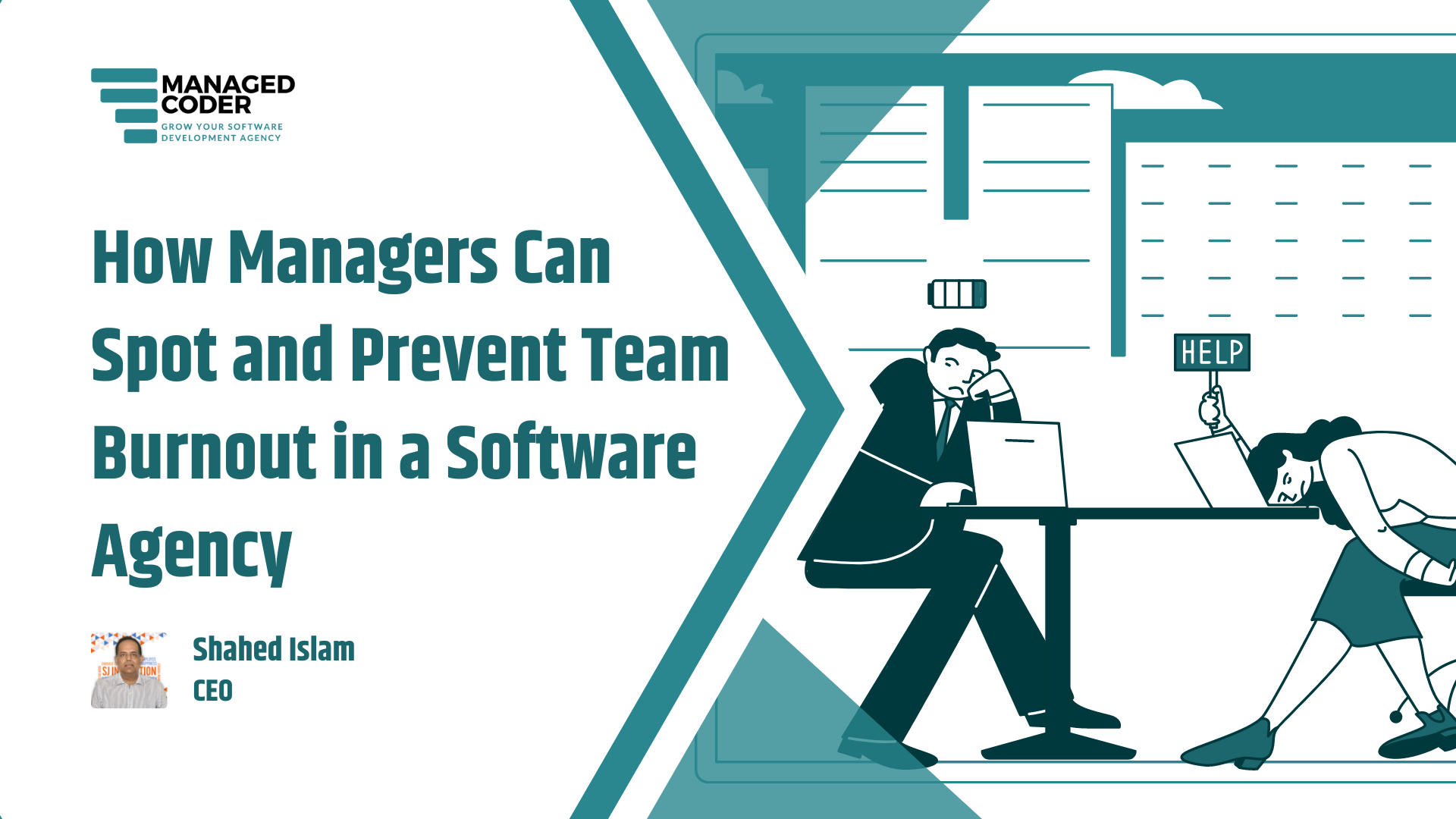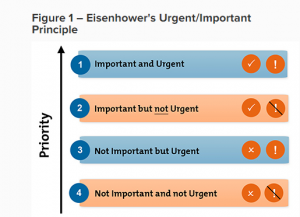
As a manager of a tech agency, you may have noticed these scenarios:
- You began your career feeling immensely passionate about coding or programming, but of late, that spark of motivation for doing tasks is diminishing.
- You are overloading yourself with tasks, but in the bargain, not accomplishing any real goal.
- You have aimlessly opened too many tabs in your browser, and your team is frequently bombarding you with requests, making it difficult to concentrate on the task at hand.
If you have been in these situations, you are not alone and maybe experiencing burnout.
While it’s natural for everyone in an organization, from the manager to your team members, to encounter it, there are ways to detect and avoid team burnout. Here is how you, as a manager, can overcome and also help your team members conquer this feeling.
How can you notice burnout in employees?
Team burnout meaning can be described as any of these below-mentioned signs.
- Frequent feelings of frustration, emptiness, irritation
- Cynicism and depression
- Mistakes while carrying out tasks
- Fatigue of the physical or/and mental kind
- Mood swings, insomnia, tiredness, incompetence
- Feeling disconnected from everyone/Lack of interest in things you enjoy doing
You can also refer to an employee burnout cheat sheet to make it easier to recognize employee burnout symptoms your team may be going through.
So what do you do when a team member experiences burnout?
1) Have a one-on-one conversation
- Sit and talk: There are questions to ask staff about burnout, which can revolve around any change you notice in their attitude and performance. Any irregular behavior where they do not seem like their usual selves is cause for concern. If you notice this, just sit down and interact with them.
- Get to the root of the issue: Understand what is troubling them and discuss the issues they are facing so you can provide the required assistance.
- 5-min check-in: Buzz a team member at random and have a casual conversation to understand the moods and offer help/guidance planning a longer meeting.
2) Keep a realistic approach on deadlines
- Tight deadlines are a no-no: Nudging your employees to live up to their potential is good but refrain from setting unrealistic deadlines.
- Work at a pace that is efficient yet comfortable: Developers need their time and space to write code successfully or else it can have detrimental effects on new products, and customers are affected.
- Ask employees to give a deadline: Managers can talk to developers on a timeline that works for them. You can then fact-check these estimates with projects similar to the one they are working on.
3) Learn to distinguish between urgent and important tasks
- Define urgent and important: Important activities are those that lead us to achieve our goals. Urgent tasks, on the other hand, require immediate attention and are linked to achieving another individual’s goal.
- Eisenhower’s principle works wonders: Ask your team to make a list of all the activities that need to be done. Make sure to also include those tasks that take up a great deal of your time even if it is not important. Take each task and put it in one of these categories shown in the figure.

- Categorize your tasks: Make sure your team knows this: For important and urgent activities, identify which activities you could have foreseen, and think about how you could schedule similar activities ahead of time so that they don’t become urgent. For important but not urgent activities, make sure you have plenty of time to do the important activities properly so that they do not become urgent. Also, remember to leave enough time in your schedule to deal with unforeseen problems. Urgent but not important tasks are things that prevent you from achieving your goals. Ask yourself whether you can reschedule or delegate them. If activities are neither important nor urgent, the tasks are just a distraction – avoid them if possible.
4) Analyze job requirements and have boundaries
- Manage overload: Know what is expected of your team and confirm your priorities. In this way, distractions can be cut out and you can focus on what’s important.
- Manage time effectively: Make a personal to-do list, prioritize tasks, and set personal goals. Also, be aware of every team member’s boundaries so when they say a task is beyond their capacity, they are able to voice it out openly.
5) The right balance is key
- Focus on productivity and enthusiasm: Moving towards the organization’s values and staying productive is vital, but you should ensure you keep the enthusiasm alive while you do so.
- Your employees should know you have their back: Build enthusiasm, do not ignore anyone on your team, and assure your employees that you are on their side, even when they make a mistake.
- Build trust: Boost morale, build up their confidence and significantly minimize pressure. All these factors help to create trust between each other.
6) It’s good to take a break
- More hours at work does not mean productivity: The more amount of time your employees put in does not always assure better results. On the contrary, it can cause added stress which eventually causes burnout.
- Take time out to relax: Avoid overworking and take a break (especially from your phone or computer) every few months or so. It gives you time to unwind which in turn, helps you resume work in a more productive manner.
7) Pay attention to wellness and physical activity
- Clear those mental blocks: Set aside time for physical activity during the workday, even if it is just for a walk. It can help clear a developer’s head and can help them get back to their task with a fresher perspective.
-
- Stress significantly reduces: Looking after your well-being by doing some form of physical activity works to break the monotony of your routine work activities, helping to ease stress.
- Schedule wellness programs: As a manager, it’s important to work with HR to incorporate burnout group activities and wellness programs that help members ease the pressure, stay fit, go for mental health treatment when required, and eat on time.
8) Establish a culture of recognizing good work
- Employees thrive when feeling appreciated: When employees are appreciated for their good work, they feel motivated and good about themselves.
- Lack of feedback makes them feel neglected: Without encouragement and feedback, team burnout will surely increase so ensure feedback between managers and employees as well as among the team members occurs frequently.
9) Variety is the spice of life
- Infuse variety into work activities: Blend easy and low priority tasks with creative and challenging work as it works to increase interest.
- Boredom can kill motivation: When a developer is bored with the task at hand, setting it aside and working on a task that interests them helps to build motivation and reduce burnout.
10) Work as a team to manage the workload
- Relieve members of certain tasks: If the workload is a bit much on a certain member, delegate the task to another member who isn’t so overloaded with responsibilities.
- Coordinate and communicate: This ensures the team knows when members need a break and work is spilt evenly so that no individual feels overworked.
- Use IQ and EQ to your advantage: Your IQ (Intelligence Quotient) and EQ (Emotional Quotient) can be used effectively to find that ideal balance between meeting deadlines and helping members manage workload.
- Identify challenges: Always ask team members if they are facing any challenges (work or personal). Make the right decision to see how these challenges can be resolved, whether by offering a day off or providing the correct guidance/encouragement.
11) Other ways to minimize stress
Whether you yourself are tackling manager burnout covid related symptoms or are helping your team recuperate from it, you can also incorporate these tricks.
- Breaks in between work: Ensure employees take breaks in between work to get fresh air outdoors so that they can recuperate a little every day.
-
- Music therapy helps: Allow your employees to listen to music as it works to boost their concentration levels.
- Offer required training sessions: This equips them with the skills they need to manage tasks they may otherwise find grueling.
- Make remote work possible: This can be a blessing for members that have to go through long hours of commute regularly. Alternatively, allowing at least part-time Work From Home works wonders.
Although employee burnout among techs, developers, and professionals in the software development industry is prevalent, it can have devastating consequences. People may leave the company and, in extreme cases, even quit their careers. This can be detrimental as good developers are a prerequisite in the software field.
With these tips and tricks, however, recognizing burnout in colleagues becomes easier. You can then effectively cope with managing burnout excellently.
